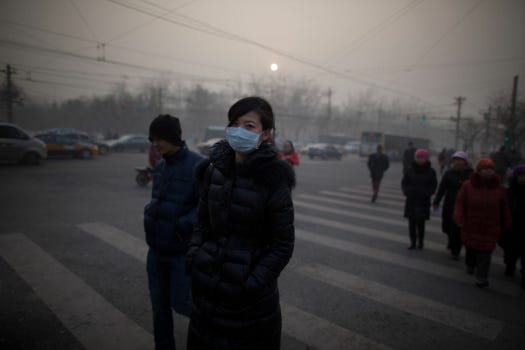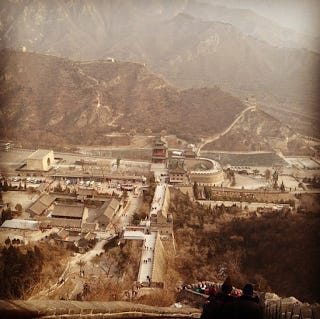Why China Can't Win
I just spent a weekend in Beijing, a quick jaunt from Shanghai where I have been for work. It is my second trip to Shanghai, which is an extremely modern, hectic city that feels more like New York or what I feel like Tokyo is like (a place I still wish to visit), but lacks much of the history one thinks about when they think of China. Last year when visiting here, I told myself I’d visit Beijing the next go-round, so I decided to fly out for a quick weekend.
First (because this is going to get negative shortly) I will say that I am extremely fortunate to have such an opportunity, and that seeing things like the Great Wall of China and the Forbidden City are moments I trust I won’t soon or ever forget.

But – and there is, of course, a “but” – I had the (mis)fortune to visit during a particularly bad bout of pollution (something Twitter named #airpocalypse in short order) – in the days preceding my trip to Beijing, the air level was about 750 on a scale that maxes out at 500 and where above 300 is considered very unhealthy. I know that it was considerably better when I visited, but I don’t know the measurement, nor do I think I want to.
Because here’s the thing – it was horrific. In the airport, at baggage claim, the air was hazy, an orange smog hovering over the conveyor belts. This was inside, a fact I think I need to repeat. Walking outside, even at night the sky was light orange, and my throat immediately tasted raw, chalky and burnt.

The next morning, it was … insane is too strong of a word, but it was surreal at the least. My tour guide kept saying it was “hazy” but at least did acknowledge that it was pollution. Of course, many in China wear a face mask – something I didn’t understand originally. I once thought it was like the SARS epidemic, a fear of germs. Last year, it was so bitter cold in Shanghai I was told and thought it was about keeping one’s face warm. But no, of course – of course – it’s about the particulates in the air. The horrid, almost unimaginable taste of the air … and that nobody seems to care about.

This … this is what gets me. It is a way of life here, that the air is rotten, sour and acrid. I drove 90 minutes out of central Beijing, to tackle the Great Wall (my thighs still burn from the climb) – and I was gasping for breath not just because of my lack of conditioning or the altitude, but because each breath I took hurt.
I know that the US and China have a coopetition – that is, many companies outsource to China (my company is one, though we outsource technical developers, not manufacturing, etc.) and complain that the Chinese do not adhere to the same ‘stifling’ regulations we have in the US, making their goods cheaper, etc. I know that China essentially owns the US, or at least enough of our debt to wage economic war should they so choose. I know that they have 2.5 million active people in their military, or more than twice as many as the US. I know this, and I know many other things, all of which seem to suggest that China is a country not to be trifled with.
I know this. I do.
And yet … I simply can’t believe that a country that is actively poisoning its citizens can win. I see the little children running around, as adorable as any American boy and girl, and I worry that their lungs are better now than they will ever be. I see the entire country coughing and spitting (and smoking) and I can see that the government isn’t doing a lick about it. Beijing has 20MM citizens and 14MM cars, all of which seem to be on the road. Unlike Europe, where you see “smart cars” everywhere, the trend here is bigger and better. Manufacturing pours waste into the air and water, all to save a buck.
In short, it is where the US was years ago before the government insisted that this got better. (And not without complaints that remain to this day, of course.) It is the days of Upton Sinclair, of the Industrial Revolution in Britain, of companies pouring waste into water supplies. It is what we look back on and know, if we know nothing else, that we're better than that. We've learned what responsibility is, and we know that a society bears cost, and that these costs are worth it.
I know, of course, that China is a very different type of government, but I also just don’t believe that a country who treats its citizens like chattel, like disposable parts that can be replaced, can WIN. It is a proud and strong nation, but it won’t stay this way if half the country is using nationalized healthcare for emphysema and lung cancer. (And if they don’t treat them, they’ll die faster.)
Perhaps this is my liberal naivety, perhaps it’s something else to prove me wrong. But … I just don’t see it.

